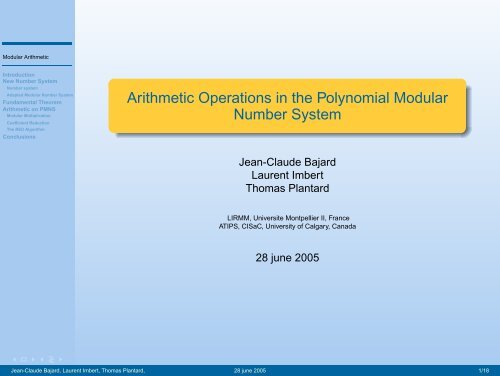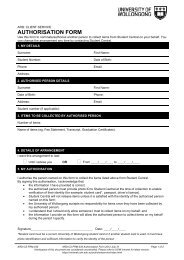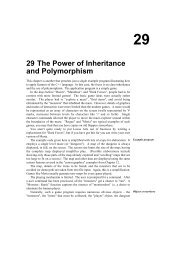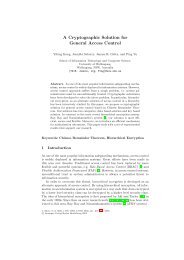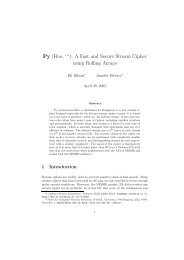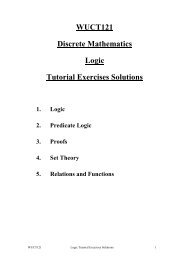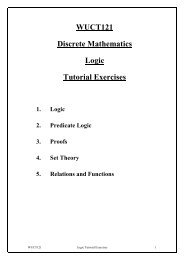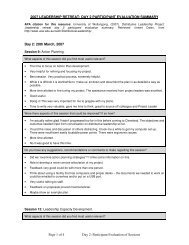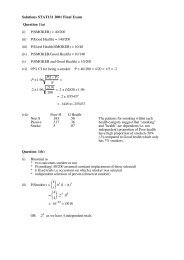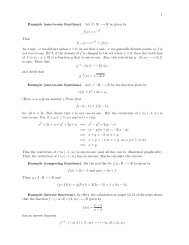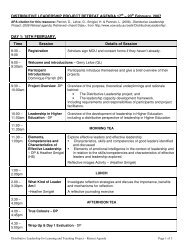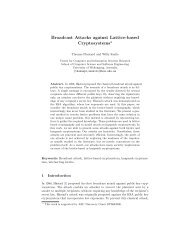Arithmetic Operations in the Polynomial Modular Number System
Arithmetic Operations in the Polynomial Modular Number System
Arithmetic Operations in the Polynomial Modular Number System
Create successful ePaper yourself
Turn your PDF publications into a flip-book with our unique Google optimized e-Paper software.
LIRMM<br />
<strong>Modular</strong> <strong>Arithmetic</strong><br />
Introduction<br />
New <strong>Number</strong> <strong>System</strong><br />
<strong>Number</strong> system<br />
Adapted <strong>Modular</strong> <strong>Number</strong> <strong>System</strong><br />
Fundamental Theorem<br />
<strong>Arithmetic</strong> on PMNS<br />
<strong>Modular</strong> Multiplication<br />
Coefficient Reduction<br />
The RED Algorithm<br />
Conclusions<br />
<strong>Arithmetic</strong> <strong>Operations</strong> <strong>in</strong> <strong>the</strong> <strong>Polynomial</strong> <strong>Modular</strong><br />
<strong>Number</strong> <strong>System</strong><br />
Jean-Claude Bajard<br />
Laurent Imbert<br />
Thomas Plantard<br />
LIRMM, Universite Montpellier II, France<br />
ATIPS, CISaC, University of Calgary, Canada<br />
28 june 2005<br />
Jean-Claude Bajard, Laurent Imbert, Thomas Plantard, 28 june 2005 1/18
LIRMM<br />
Plan<br />
<strong>Modular</strong> <strong>Arithmetic</strong><br />
Introduction<br />
New <strong>Number</strong> <strong>System</strong><br />
<strong>Number</strong> system<br />
Adapted <strong>Modular</strong> <strong>Number</strong> <strong>System</strong><br />
Fundamental Theorem<br />
<strong>Arithmetic</strong> on PMNS<br />
<strong>Modular</strong> Multiplication<br />
Coefficient Reduction<br />
The RED Algorithm<br />
Conclusions<br />
1 Introduction<br />
2 New <strong>Number</strong> <strong>System</strong><br />
<strong>Number</strong> system<br />
Adapted <strong>Modular</strong> <strong>Number</strong> <strong>System</strong><br />
3 Fundamental Theorem<br />
4 <strong>Arithmetic</strong> on PMNS<br />
<strong>Modular</strong> Multiplication<br />
Coefficient Reduction<br />
The RED Algorithm<br />
5 Conclusions<br />
Jean-Claude Bajard, Laurent Imbert, Thomas Plantard, 28 june 2005 2/18
LIRMM<br />
Introduction<br />
<strong>Modular</strong> <strong>Arithmetic</strong><br />
Introduction<br />
New <strong>Number</strong> <strong>System</strong><br />
<strong>Number</strong> system<br />
Adapted <strong>Modular</strong> <strong>Number</strong> <strong>System</strong><br />
Fundamental Theorem<br />
<strong>Arithmetic</strong> on PMNS<br />
<strong>Modular</strong> Multiplication<br />
Coefficient Reduction<br />
The RED Algorithm<br />
Conclusions<br />
1 Introduction<br />
2 New <strong>Number</strong> <strong>System</strong><br />
<strong>Number</strong> system<br />
Adapted <strong>Modular</strong> <strong>Number</strong> <strong>System</strong><br />
3 Fundamental Theorem<br />
4 <strong>Arithmetic</strong> on PMNS<br />
<strong>Modular</strong> Multiplication<br />
Coefficient Reduction<br />
The RED Algorithm<br />
5 Conclusions<br />
Jean-Claude Bajard, Laurent Imbert, Thomas Plantard, 28 june 2005 3/18
LIRMM<br />
<strong>Arithmetic</strong> needs for public key cryptography<br />
<strong>Modular</strong> <strong>Arithmetic</strong><br />
Introduction<br />
New <strong>Number</strong> <strong>System</strong><br />
<strong>Number</strong> system<br />
Adapted <strong>Modular</strong> <strong>Number</strong> <strong>System</strong><br />
Fundamental Theorem<br />
<strong>Arithmetic</strong> on PMNS<br />
<strong>Modular</strong> Multiplication<br />
Coefficient Reduction<br />
The RED Algorithm<br />
Conclusions<br />
Diffie-Hellman<br />
An exponentiation over <strong>the</strong> prime field F p<br />
Needs : Multiplication modulo p (prime)<br />
Length : 1024, 2048, . . . bits<br />
RSA<br />
An exponentiation on <strong>the</strong> r<strong>in</strong>g Z/nZ<br />
Needs : Multiplication modulo n (composite, n = p.q)<br />
Length : 1024, 2048, . . . bits<br />
ECC<br />
Elliptic curve po<strong>in</strong>t multiplication<br />
Needs : <strong>Arithmetic</strong> operations (+,-,*,/) over <strong>the</strong> f<strong>in</strong>ite field F q, where<br />
q is a power of a prime p<br />
Length : 160, 192, . . . bits<br />
Jean-Claude Bajard, Laurent Imbert, Thomas Plantard, 28 june 2005 4/18
LIRMM<br />
New <strong>Number</strong> <strong>System</strong><br />
<strong>Modular</strong> <strong>Arithmetic</strong><br />
Introduction<br />
New <strong>Number</strong> <strong>System</strong><br />
<strong>Number</strong> system<br />
Adapted <strong>Modular</strong> <strong>Number</strong> <strong>System</strong><br />
Fundamental Theorem<br />
<strong>Arithmetic</strong> on PMNS<br />
<strong>Modular</strong> Multiplication<br />
Coefficient Reduction<br />
The RED Algorithm<br />
Conclusions<br />
1 Introduction<br />
2 New <strong>Number</strong> <strong>System</strong><br />
<strong>Number</strong> system<br />
Adapted <strong>Modular</strong> <strong>Number</strong> <strong>System</strong><br />
3 Fundamental Theorem<br />
4 <strong>Arithmetic</strong> on PMNS<br />
<strong>Modular</strong> Multiplication<br />
Coefficient Reduction<br />
The RED Algorithm<br />
5 Conclusions<br />
Jean-Claude Bajard, Laurent Imbert, Thomas Plantard, 28 june 2005 5/18
LIRMM<br />
<strong>Number</strong> system<br />
<strong>Modular</strong> <strong>Arithmetic</strong><br />
Introduction<br />
New <strong>Number</strong> <strong>System</strong><br />
<strong>Number</strong> system<br />
Adapted <strong>Modular</strong> <strong>Number</strong> <strong>System</strong><br />
Fundamental Theorem<br />
<strong>Arithmetic</strong> on PMNS<br />
<strong>Modular</strong> Multiplication<br />
Coefficient Reduction<br />
The RED Algorithm<br />
Conclusions<br />
Positional number system with radix β<br />
n−1 X<br />
X = x i β i with x i ∈ {0, ...β − 1}<br />
i=0<br />
Example : X = 1315 = (3, 4, 4, 2) 8 = 3 + 4 × 8 + 4 × 8 2 + 2 × 8 3<br />
<strong>Modular</strong> number system MNS(p, n, γ, ρ)<br />
n−1 X<br />
X = x i γ i mod P with x i ∈ {0, . . . , ρ − 1}<br />
i=0<br />
Jean-Claude Bajard, Laurent Imbert, Thomas Plantard, 28 june 2005 6/18
LIRMM<br />
<strong>Modular</strong> <strong>Arithmetic</strong><br />
Introduction<br />
New <strong>Number</strong> <strong>System</strong><br />
<strong>Number</strong> system<br />
Adapted <strong>Modular</strong> <strong>Number</strong> <strong>System</strong><br />
Fundamental Theorem<br />
<strong>Arithmetic</strong> on PMNS<br />
<strong>Modular</strong> Multiplication<br />
Coefficient Reduction<br />
The RED Algorithm<br />
Conclusions<br />
Example<br />
MNS(p = 17, n = 3, γ = 7, ρ = 3)<br />
a = P 2<br />
i=0 x i 7 i mod 17 with a i ∈ {0, 1, 2}<br />
0 1 2 3 4 5<br />
6 7 8 9 10 11<br />
12 13 14 15 16<br />
Jean-Claude Bajard, Laurent Imbert, Thomas Plantard, 28 june 2005 7/18
LIRMM<br />
<strong>Modular</strong> <strong>Arithmetic</strong><br />
Introduction<br />
New <strong>Number</strong> <strong>System</strong><br />
<strong>Number</strong> system<br />
Adapted <strong>Modular</strong> <strong>Number</strong> <strong>System</strong><br />
Fundamental Theorem<br />
<strong>Arithmetic</strong> on PMNS<br />
<strong>Modular</strong> Multiplication<br />
Coefficient Reduction<br />
The RED Algorithm<br />
Conclusions<br />
Example<br />
MNS(p = 17, n = 3, γ = 7, ρ = 3)<br />
a = P 2<br />
i=0 x i 7 i mod 17 with a i ∈ {0, 1, 2}<br />
0 1 2 3 4 5<br />
(0, 0, 0) (0, 0, 1) (0, 0, 2)<br />
6 7 8 9 10 11<br />
12 13 14 15 16<br />
Jean-Claude Bajard, Laurent Imbert, Thomas Plantard, 28 june 2005 7/18
LIRMM<br />
<strong>Modular</strong> <strong>Arithmetic</strong><br />
Introduction<br />
New <strong>Number</strong> <strong>System</strong><br />
<strong>Number</strong> system<br />
Adapted <strong>Modular</strong> <strong>Number</strong> <strong>System</strong><br />
Fundamental Theorem<br />
<strong>Arithmetic</strong> on PMNS<br />
<strong>Modular</strong> Multiplication<br />
Coefficient Reduction<br />
The RED Algorithm<br />
Conclusions<br />
Example<br />
MNS(p = 17, n = 3, γ = 7, ρ = 3)<br />
a = P 2<br />
i=0 x i 7 i mod 17 with a i ∈ {0, 1, 2}<br />
0 1 2 3 4 5<br />
(0, 0, 0) (0, 0, 1) (0, 0, 2)<br />
6 7 8 9 10 11<br />
(0, 1, 0) (0, 1, 1) (0, 1, 2)<br />
12 13 14 15 16<br />
Jean-Claude Bajard, Laurent Imbert, Thomas Plantard, 28 june 2005 7/18
LIRMM<br />
<strong>Modular</strong> <strong>Arithmetic</strong><br />
Introduction<br />
New <strong>Number</strong> <strong>System</strong><br />
<strong>Number</strong> system<br />
Adapted <strong>Modular</strong> <strong>Number</strong> <strong>System</strong><br />
Fundamental Theorem<br />
<strong>Arithmetic</strong> on PMNS<br />
<strong>Modular</strong> Multiplication<br />
Coefficient Reduction<br />
The RED Algorithm<br />
Conclusions<br />
Example<br />
MNS(p = 17, n = 3, γ = 7, ρ = 3)<br />
a = P 2<br />
i=0 x i 7 i mod 17 with a i ∈ {0, 1, 2}<br />
0 1 2 3 4 5<br />
(0, 0, 0) (0, 0, 1) (0, 0, 2)<br />
6 7 8 9 10 11<br />
(0, 1, 0) (0, 1, 1) (0, 1, 2)<br />
12 13 14 15 16<br />
(0, 2, 0) (0, 2, 1) (0, 2, 2)<br />
Jean-Claude Bajard, Laurent Imbert, Thomas Plantard, 28 june 2005 7/18
LIRMM<br />
<strong>Modular</strong> <strong>Arithmetic</strong><br />
Introduction<br />
New <strong>Number</strong> <strong>System</strong><br />
<strong>Number</strong> system<br />
Adapted <strong>Modular</strong> <strong>Number</strong> <strong>System</strong><br />
Fundamental Theorem<br />
<strong>Arithmetic</strong> on PMNS<br />
<strong>Modular</strong> Multiplication<br />
Coefficient Reduction<br />
The RED Algorithm<br />
Conclusions<br />
Example<br />
MNS(p = 17, n = 3, γ = 7, ρ = 3)<br />
a = P 2<br />
i=0 x i 7 i mod 17 with a i ∈ {0, 1, 2}<br />
0 1 2 3 4 5<br />
(0, 0, 0) (0, 0, 1) (0, 0, 2) (1, 1, 0)<br />
6 7 8 9 10 11<br />
(1, 1, 1) (0, 1, 0) (0, 1, 1) (0, 1, 2)<br />
12 13 14 15 16<br />
(1, 2, 0) (1, 2, 1) (0, 2, 0) (0, 2, 1) (0, 2, 2)<br />
Jean-Claude Bajard, Laurent Imbert, Thomas Plantard, 28 june 2005 7/18
LIRMM<br />
<strong>Modular</strong> <strong>Arithmetic</strong><br />
Introduction<br />
New <strong>Number</strong> <strong>System</strong><br />
<strong>Number</strong> system<br />
Adapted <strong>Modular</strong> <strong>Number</strong> <strong>System</strong><br />
Fundamental Theorem<br />
<strong>Arithmetic</strong> on PMNS<br />
<strong>Modular</strong> Multiplication<br />
Coefficient Reduction<br />
The RED Algorithm<br />
Conclusions<br />
Example<br />
MNS(p = 17, n = 3, γ = 7, ρ = 3)<br />
a = P 2<br />
i=0 x i 7 i mod 17 with a i ∈ {0, 1, 2}<br />
0 1 2 3 4 5<br />
(0, 0, 0) (0, 0, 1) (0, 0, 2) (2, 1, 1) (2, 1, 2) (1, 1, 0)<br />
6 7 8 9 10 11<br />
(1, 1, 1) (0, 1, 0) (0, 1, 1) (0, 1, 2) (2, 2, 0) (2, 2, 1)<br />
12 13 14 15 16<br />
(1, 2, 0) (1, 2, 1) (0, 2, 0) (0, 2, 1) (0, 2, 2)<br />
Jean-Claude Bajard, Laurent Imbert, Thomas Plantard, 28 june 2005 7/18
LIRMM<br />
How f<strong>in</strong>d a “good” <strong>Modular</strong> <strong>Number</strong> <strong>System</strong> ?<br />
<strong>Modular</strong> <strong>Arithmetic</strong><br />
Introduction<br />
New <strong>Number</strong> <strong>System</strong><br />
<strong>Number</strong> system<br />
Adapted <strong>Modular</strong> <strong>Number</strong> <strong>System</strong><br />
Fundamental Theorem<br />
<strong>Arithmetic</strong> on PMNS<br />
<strong>Modular</strong> Multiplication<br />
Coefficient Reduction<br />
The RED Algorithm<br />
Conclusions<br />
What do we need ?<br />
1 A MNS where ρ is small (about ρ ∼ p 1/n )<br />
2 A “fast” arithmetic on <strong>the</strong> MNS<br />
Def<strong>in</strong>ition : AMNS<br />
A modular number system B = MNS(p, n, γ, ρ) is called Adapted<br />
<strong>Modular</strong> <strong>Number</strong> <strong>System</strong> (AMNS) if<br />
with c is a small <strong>in</strong>teger.<br />
γ n mod P = c,<br />
Jean-Claude Bajard, Laurent Imbert, Thomas Plantard, 28 june 2005 8/18
LIRMM<br />
Fundamental Theorem<br />
<strong>Modular</strong> <strong>Arithmetic</strong><br />
Introduction<br />
New <strong>Number</strong> <strong>System</strong><br />
<strong>Number</strong> system<br />
Adapted <strong>Modular</strong> <strong>Number</strong> <strong>System</strong><br />
Fundamental Theorem<br />
<strong>Arithmetic</strong> on PMNS<br />
<strong>Modular</strong> Multiplication<br />
Coefficient Reduction<br />
The RED Algorithm<br />
Conclusions<br />
1 Introduction<br />
2 New <strong>Number</strong> <strong>System</strong><br />
<strong>Number</strong> system<br />
Adapted <strong>Modular</strong> <strong>Number</strong> <strong>System</strong><br />
3 Fundamental Theorem<br />
4 <strong>Arithmetic</strong> on PMNS<br />
<strong>Modular</strong> Multiplication<br />
Coefficient Reduction<br />
The RED Algorithm<br />
5 Conclusions<br />
Jean-Claude Bajard, Laurent Imbert, Thomas Plantard, 28 june 2005 9/18
LIRMM<br />
Fundamental Theorem<br />
<strong>Modular</strong> <strong>Arithmetic</strong><br />
Introduction<br />
New <strong>Number</strong> <strong>System</strong><br />
<strong>Number</strong> system<br />
Adapted <strong>Modular</strong> <strong>Number</strong> <strong>System</strong><br />
Fundamental Theorem<br />
<strong>Arithmetic</strong> on PMNS<br />
<strong>Modular</strong> Multiplication<br />
Coefficient Reduction<br />
The RED Algorithm<br />
Conclusions<br />
Def<strong>in</strong>ition<br />
A MNS(p, n, γ, ρ) is called <strong>Polynomial</strong> <strong>Modular</strong> <strong>Number</strong> <strong>System</strong><br />
(PMNS) if ∃E(X) = X n + aX + b such that<br />
1 E is irreducible <strong>in</strong> Z[X]<br />
2 E(γ) ≡ 0 (mod p)<br />
3 ρ ≥ (|a| + |b|)p 1/n<br />
Theorem<br />
A PMNS can represent all <strong>the</strong> <strong>in</strong>teger of [0, p − 1].<br />
∀a ∈ [0, p − 1], ∃A ∈ Z[X] such that<br />
1 A(γ) = a mod p<br />
2 deg A < n<br />
3 ‖A‖ ∞ = max 0≤i
LIRMM<br />
Example<br />
<strong>Modular</strong> <strong>Arithmetic</strong><br />
Introduction<br />
New <strong>Number</strong> <strong>System</strong><br />
<strong>Number</strong> system<br />
Adapted <strong>Modular</strong> <strong>Number</strong> <strong>System</strong><br />
Fundamental Theorem<br />
<strong>Arithmetic</strong> on PMNS<br />
<strong>Modular</strong> Multiplication<br />
Coefficient Reduction<br />
The RED Algorithm<br />
Conclusions<br />
Example<br />
1 We choose p = 250043<br />
2 We choose n = 3<br />
3 We have X 3 − 2 is irreducible <strong>in</strong> Z[X].<br />
4 We have γ = 127006 is a root of X 3 − 2 modulo p<br />
ρ<br />
1 (|0| + | − 2|)p 1/3 = 2.250043 1/3 < 128 = ρ<br />
2 PMNS(p = 250043, n = 3, γ = 127006, ρ = 128)<br />
Jean-Claude Bajard, Laurent Imbert, Thomas Plantard, 28 june 2005 11/18
LIRMM<br />
<strong>Arithmetic</strong> on PMNS<br />
<strong>Modular</strong> <strong>Arithmetic</strong><br />
Introduction<br />
New <strong>Number</strong> <strong>System</strong><br />
<strong>Number</strong> system<br />
Adapted <strong>Modular</strong> <strong>Number</strong> <strong>System</strong><br />
Fundamental Theorem<br />
<strong>Arithmetic</strong> on PMNS<br />
<strong>Modular</strong> Multiplication<br />
Coefficient Reduction<br />
The RED Algorithm<br />
Conclusions<br />
1 Introduction<br />
2 New <strong>Number</strong> <strong>System</strong><br />
<strong>Number</strong> system<br />
Adapted <strong>Modular</strong> <strong>Number</strong> <strong>System</strong><br />
3 Fundamental Theorem<br />
4 <strong>Arithmetic</strong> on PMNS<br />
<strong>Modular</strong> Multiplication<br />
Coefficient Reduction<br />
The RED Algorithm<br />
5 Conclusions<br />
Jean-Claude Bajard, Laurent Imbert, Thomas Plantard, 28 june 2005 12/18
LIRMM<br />
<strong>Arithmetic</strong> on PMNS<br />
<strong>Modular</strong> <strong>Arithmetic</strong><br />
Introduction<br />
New <strong>Number</strong> <strong>System</strong><br />
<strong>Number</strong> system<br />
Adapted <strong>Modular</strong> <strong>Number</strong> <strong>System</strong><br />
Fundamental Theorem<br />
<strong>Arithmetic</strong> on PMNS<br />
<strong>Modular</strong> Multiplication<br />
Coefficient Reduction<br />
The RED Algorithm<br />
Conclusions<br />
<strong>Modular</strong> Multiplication <strong>in</strong> PMNS<br />
1 <strong>Polynomial</strong> multiplication <strong>in</strong> Z[X] : C(X) ← A(X) B(X)<br />
2 <strong>Polynomial</strong> reduction : C ′ (X) ← C(X) mod E(X)<br />
3 Coefficient reduction : R ← CR(V ), gives R(γ) ≡ C ′ (γ) (mod p)<br />
Generalization<br />
operation on PMNS → polynomial operation + coefficient reduction<br />
Jean-Claude Bajard, Laurent Imbert, Thomas Plantard, 28 june 2005 13/18
LIRMM<br />
Example<br />
<strong>Modular</strong> <strong>Arithmetic</strong><br />
Introduction<br />
New <strong>Number</strong> <strong>System</strong><br />
<strong>Number</strong> system<br />
Adapted <strong>Modular</strong> <strong>Number</strong> <strong>System</strong><br />
Fundamental Theorem<br />
<strong>Arithmetic</strong> on PMNS<br />
<strong>Modular</strong> Multiplication<br />
Coefficient Reduction<br />
The RED Algorithm<br />
Conclusions<br />
PMNS<br />
PMNS(p = 250043, n = 3, γ = 127006, ρ = 128)<br />
Input<br />
A = 7 + 30X + 100X 2 ⇒ A = 65842<br />
B = 59 + 2X + 76X 2 ⇒ B = 8816<br />
Algorithm<br />
1 C(X) = A(X) × B(X)<br />
U(X) = 413 + 1784X + 6492X 2 + 2480X 3 + 7600X 4<br />
2 C ′ (X) = C(X) mod (X 3 − 2) ← 5373 + 16984X + 6492X 2<br />
3 R(X) =?<br />
Jean-Claude Bajard, Laurent Imbert, Thomas Plantard, 28 june 2005 14/18
LIRMM<br />
General Coefficient Reduction<br />
<strong>Modular</strong> <strong>Arithmetic</strong><br />
Introduction<br />
New <strong>Number</strong> <strong>System</strong><br />
<strong>Number</strong> system<br />
Adapted <strong>Modular</strong> <strong>Number</strong> <strong>System</strong><br />
Fundamental Theorem<br />
<strong>Arithmetic</strong> on PMNS<br />
<strong>Modular</strong> Multiplication<br />
Coefficient Reduction<br />
The RED Algorithm<br />
Conclusions<br />
Input<br />
A vector V with ‖V ‖ ∞ < 2 t<br />
Algorithm<br />
1 R ← V<br />
2 WHILE t > k s DO<br />
1 R = R2 t−ke + R<br />
2 R ← RED(R)<br />
3 R ← R2 t−ke + R<br />
4 t ← t − (k e − k s)<br />
Output<br />
A vector R ≡ V<br />
With coefficients<br />
‖R‖ ∞ < ρ = 2 ks<br />
Jean-Claude Bajard, Laurent Imbert, Thomas Plantard, 28 june 2005 15/18
LIRMM<br />
General Coefficient Reduction<br />
<strong>Modular</strong> <strong>Arithmetic</strong><br />
Introduction<br />
New <strong>Number</strong> <strong>System</strong><br />
<strong>Number</strong> system<br />
Adapted <strong>Modular</strong> <strong>Number</strong> <strong>System</strong><br />
Fundamental Theorem<br />
<strong>Arithmetic</strong> on PMNS<br />
<strong>Modular</strong> Multiplication<br />
Coefficient Reduction<br />
The RED Algorithm<br />
Conclusions<br />
Input<br />
A vector V with ‖V ‖ ∞ < 2 t<br />
Algorithm<br />
1 R ← V<br />
2 WHILE t > k s DO<br />
1 R = R2 t−ke + R<br />
2 R ← RED(R)<br />
3 R ← R2 t−ke + R<br />
4 t ← t − (k e − k s)<br />
Output<br />
A vector R ≡ V<br />
With coefficients<br />
‖R‖ ∞ < ρ = 2 ks<br />
Jean-Claude Bajard, Laurent Imbert, Thomas Plantard, 28 june 2005 15/18
LIRMM<br />
General Coefficient Reduction<br />
<strong>Modular</strong> <strong>Arithmetic</strong><br />
Introduction<br />
New <strong>Number</strong> <strong>System</strong><br />
<strong>Number</strong> system<br />
Adapted <strong>Modular</strong> <strong>Number</strong> <strong>System</strong><br />
Fundamental Theorem<br />
<strong>Arithmetic</strong> on PMNS<br />
<strong>Modular</strong> Multiplication<br />
Coefficient Reduction<br />
The RED Algorithm<br />
Conclusions<br />
Input<br />
A vector V with ‖V ‖ ∞ < 2 t<br />
Algorithm<br />
1 R ← V<br />
2 WHILE t > k s DO<br />
1 R = R2 t−ke + R<br />
2 R ← RED(R)<br />
3 R ← R2 t−ke + R<br />
4 t ← t − (k e − k s)<br />
Output<br />
A vector R ≡ V<br />
With coefficients<br />
‖R‖ ∞ < ρ = 2 ks<br />
Jean-Claude Bajard, Laurent Imbert, Thomas Plantard, 28 june 2005 15/18
LIRMM<br />
General Coefficient Reduction<br />
<strong>Modular</strong> <strong>Arithmetic</strong><br />
Introduction<br />
New <strong>Number</strong> <strong>System</strong><br />
<strong>Number</strong> system<br />
Adapted <strong>Modular</strong> <strong>Number</strong> <strong>System</strong><br />
Fundamental Theorem<br />
<strong>Arithmetic</strong> on PMNS<br />
<strong>Modular</strong> Multiplication<br />
Coefficient Reduction<br />
The RED Algorithm<br />
Conclusions<br />
Input<br />
A vector V with ‖V ‖ ∞ < 2 t<br />
Algorithm<br />
1 R ← V<br />
2 WHILE t > k s DO<br />
1 R = R2 t−ke + R<br />
2 R ← RED(R)<br />
3 R ← R2 t−ke + R<br />
4 t ← t − (k e − k s)<br />
Output<br />
A vector R ≡ V<br />
With coefficients<br />
‖R‖ ∞ < ρ = 2 ks<br />
Jean-Claude Bajard, Laurent Imbert, Thomas Plantard, 28 june 2005 15/18
LIRMM<br />
General Coefficient Reduction<br />
<strong>Modular</strong> <strong>Arithmetic</strong><br />
Introduction<br />
New <strong>Number</strong> <strong>System</strong><br />
<strong>Number</strong> system<br />
Adapted <strong>Modular</strong> <strong>Number</strong> <strong>System</strong><br />
Fundamental Theorem<br />
<strong>Arithmetic</strong> on PMNS<br />
<strong>Modular</strong> Multiplication<br />
Coefficient Reduction<br />
The RED Algorithm<br />
Conclusions<br />
Input<br />
A vector V with ‖V ‖ ∞ < 2 t<br />
Algorithm<br />
1 R ← V<br />
2 WHILE t > k s DO<br />
1 R = R2 t−ke + R<br />
2 R ← RED(R)<br />
3 R ← R2 t−ke + R<br />
4 t ← t − (k e − k s)<br />
Output<br />
A vector R ≡ V<br />
With coefficients<br />
‖R‖ ∞ < ρ = 2 ks<br />
Jean-Claude Bajard, Laurent Imbert, Thomas Plantard, 28 june 2005 15/18
LIRMM<br />
General Coefficient Reduction<br />
<strong>Modular</strong> <strong>Arithmetic</strong><br />
Introduction<br />
New <strong>Number</strong> <strong>System</strong><br />
<strong>Number</strong> system<br />
Adapted <strong>Modular</strong> <strong>Number</strong> <strong>System</strong><br />
Fundamental Theorem<br />
<strong>Arithmetic</strong> on PMNS<br />
<strong>Modular</strong> Multiplication<br />
Coefficient Reduction<br />
The RED Algorithm<br />
Conclusions<br />
Input<br />
A vector V with ‖V ‖ ∞ < 2 t<br />
Algorithm<br />
1 R ← V<br />
2 WHILE t > k s DO<br />
1 R = R2 t−ke + R<br />
2 R ← RED(R)<br />
3 R ← R2 t−ke + R<br />
4 t ← t − (k e − k s)<br />
Output<br />
A vector R ≡ V<br />
With coefficients<br />
‖R‖ ∞ < ρ = 2 ks<br />
Jean-Claude Bajard, Laurent Imbert, Thomas Plantard, 28 june 2005 15/18
LIRMM<br />
General Coefficient Reduction<br />
<strong>Modular</strong> <strong>Arithmetic</strong><br />
Introduction<br />
New <strong>Number</strong> <strong>System</strong><br />
<strong>Number</strong> system<br />
Adapted <strong>Modular</strong> <strong>Number</strong> <strong>System</strong><br />
Fundamental Theorem<br />
<strong>Arithmetic</strong> on PMNS<br />
<strong>Modular</strong> Multiplication<br />
Coefficient Reduction<br />
The RED Algorithm<br />
Conclusions<br />
Input<br />
A vector V with ‖V ‖ ∞ < 2 t<br />
Algorithm<br />
1 R ← V<br />
2 WHILE t > k s DO<br />
1 R = R2 t−ke + R<br />
2 R ← RED(R)<br />
3 R ← R2 t−ke + R<br />
4 t ← t − (k e − k s)<br />
Output<br />
A vector R ≡ V<br />
With coefficients<br />
‖R‖ ∞ < ρ = 2 ks<br />
Jean-Claude Bajard, Laurent Imbert, Thomas Plantard, 28 june 2005 15/18
LIRMM<br />
General Coefficient Reduction<br />
<strong>Modular</strong> <strong>Arithmetic</strong><br />
Introduction<br />
New <strong>Number</strong> <strong>System</strong><br />
<strong>Number</strong> system<br />
Adapted <strong>Modular</strong> <strong>Number</strong> <strong>System</strong><br />
Fundamental Theorem<br />
<strong>Arithmetic</strong> on PMNS<br />
<strong>Modular</strong> Multiplication<br />
Coefficient Reduction<br />
The RED Algorithm<br />
Conclusions<br />
Input<br />
A vector V with ‖V ‖ ∞ < 2 t<br />
Algorithm<br />
1 R ← V<br />
2 WHILE t > k s DO<br />
1 R = R2 t−ke + R<br />
2 R ← RED(R)<br />
3 R ← R2 t−ke + R<br />
4 t ← t − (k e − k s)<br />
Output<br />
A vector R ≡ V<br />
With coefficients<br />
‖R‖ ∞ < ρ = 2 ks<br />
Jean-Claude Bajard, Laurent Imbert, Thomas Plantard, 28 june 2005 15/18
LIRMM<br />
General Coefficient Reduction<br />
<strong>Modular</strong> <strong>Arithmetic</strong><br />
Introduction<br />
New <strong>Number</strong> <strong>System</strong><br />
<strong>Number</strong> system<br />
Adapted <strong>Modular</strong> <strong>Number</strong> <strong>System</strong><br />
Fundamental Theorem<br />
<strong>Arithmetic</strong> on PMNS<br />
<strong>Modular</strong> Multiplication<br />
Coefficient Reduction<br />
The RED Algorithm<br />
Conclusions<br />
Input<br />
A vector V with ‖V ‖ ∞ < 2 t<br />
Algorithm<br />
1 R ← V<br />
2 WHILE t > k s DO<br />
1 R = R2 t−ke + R<br />
2 R ← RED(R)<br />
3 R ← R2 t−ke + R<br />
4 t ← t − (k e − k s)<br />
Output<br />
A vector R ≡ V<br />
With coefficients<br />
‖R‖ ∞ < ρ = 2 ks<br />
Jean-Claude Bajard, Laurent Imbert, Thomas Plantard, 28 june 2005 15/18
LIRMM<br />
General Coefficient Reduction<br />
<strong>Modular</strong> <strong>Arithmetic</strong><br />
Introduction<br />
New <strong>Number</strong> <strong>System</strong><br />
<strong>Number</strong> system<br />
Adapted <strong>Modular</strong> <strong>Number</strong> <strong>System</strong><br />
Fundamental Theorem<br />
<strong>Arithmetic</strong> on PMNS<br />
<strong>Modular</strong> Multiplication<br />
Coefficient Reduction<br />
The RED Algorithm<br />
Conclusions<br />
Input<br />
A vector V with ‖V ‖ ∞ < 2 t<br />
Algorithm<br />
1 R ← V<br />
2 WHILE t > k s DO<br />
1 R = R2 t−ke + R<br />
2 R ← RED(R)<br />
3 R ← R2 t−ke + R<br />
4 t ← t − (k e − k s)<br />
Output<br />
A vector R ≡ V<br />
With coefficients<br />
‖R‖ ∞ < ρ = 2 ks<br />
Jean-Claude Bajard, Laurent Imbert, Thomas Plantard, 28 june 2005 15/18
LIRMM<br />
General Coefficient Reduction<br />
<strong>Modular</strong> <strong>Arithmetic</strong><br />
Introduction<br />
New <strong>Number</strong> <strong>System</strong><br />
<strong>Number</strong> system<br />
Adapted <strong>Modular</strong> <strong>Number</strong> <strong>System</strong><br />
Fundamental Theorem<br />
<strong>Arithmetic</strong> on PMNS<br />
<strong>Modular</strong> Multiplication<br />
Coefficient Reduction<br />
The RED Algorithm<br />
Conclusions<br />
Input<br />
A vector V with ‖V ‖ ∞ < 2 t<br />
Algorithm<br />
1 R ← V<br />
2 WHILE t > k s DO<br />
1 R = R2 t−ke + R<br />
2 R ← RED(R)<br />
3 R ← R2 t−ke + R<br />
4 t ← t − (k e − k s)<br />
Output<br />
A vector R ≡ V<br />
With coefficients<br />
‖R‖ ∞ < ρ = 2 ks<br />
Jean-Claude Bajard, Laurent Imbert, Thomas Plantard, 28 june 2005 15/18
LIRMM<br />
General Coefficient Reduction<br />
<strong>Modular</strong> <strong>Arithmetic</strong><br />
Introduction<br />
New <strong>Number</strong> <strong>System</strong><br />
<strong>Number</strong> system<br />
Adapted <strong>Modular</strong> <strong>Number</strong> <strong>System</strong><br />
Fundamental Theorem<br />
<strong>Arithmetic</strong> on PMNS<br />
<strong>Modular</strong> Multiplication<br />
Coefficient Reduction<br />
The RED Algorithm<br />
Conclusions<br />
Input<br />
A vector V with ‖V ‖ ∞ < 2 t<br />
Algorithm<br />
1 R ← V<br />
2 WHILE t > k s DO<br />
1 R = R2 t−ke + R<br />
2 R ← RED(R)<br />
3 R ← R2 t−ke + R<br />
4 t ← t − (k e − k s)<br />
Output<br />
A vector R ≡ V<br />
With coefficients<br />
‖R‖ ∞ < ρ = 2 ks<br />
Jean-Claude Bajard, Laurent Imbert, Thomas Plantard, 28 june 2005 15/18
LIRMM<br />
General Coefficient Reduction<br />
<strong>Modular</strong> <strong>Arithmetic</strong><br />
Introduction<br />
New <strong>Number</strong> <strong>System</strong><br />
<strong>Number</strong> system<br />
Adapted <strong>Modular</strong> <strong>Number</strong> <strong>System</strong><br />
Fundamental Theorem<br />
<strong>Arithmetic</strong> on PMNS<br />
<strong>Modular</strong> Multiplication<br />
Coefficient Reduction<br />
The RED Algorithm<br />
Conclusions<br />
Input<br />
A vector V with ‖V ‖ ∞ < 2 t<br />
Algorithm<br />
1 R ← V<br />
2 WHILE t > k s DO<br />
1 R = R2 t−ke + R<br />
2 R ← RED(R)<br />
3 R ← R2 t−ke + R<br />
4 t ← t − (k e − k s)<br />
Output<br />
A vector R ≡ V<br />
With coefficients<br />
‖R‖ ∞ < ρ = 2 ks<br />
Jean-Claude Bajard, Laurent Imbert, Thomas Plantard, 28 june 2005 15/18
LIRMM<br />
General Coefficient Reduction<br />
<strong>Modular</strong> <strong>Arithmetic</strong><br />
Introduction<br />
New <strong>Number</strong> <strong>System</strong><br />
<strong>Number</strong> system<br />
Adapted <strong>Modular</strong> <strong>Number</strong> <strong>System</strong><br />
Fundamental Theorem<br />
<strong>Arithmetic</strong> on PMNS<br />
<strong>Modular</strong> Multiplication<br />
Coefficient Reduction<br />
The RED Algorithm<br />
Conclusions<br />
Input<br />
A vector V with ‖V ‖ ∞ < 2 t<br />
Algorithm<br />
1 R ← V<br />
2 WHILE t > k s DO<br />
1 R = R2 t−ke + R<br />
2 R ← RED(R)<br />
3 R ← R2 t−ke + R<br />
4 t ← t − (k e − k s)<br />
Output<br />
A vector R ≡ V<br />
With coefficients<br />
‖R‖ ∞ < ρ = 2 ks<br />
Jean-Claude Bajard, Laurent Imbert, Thomas Plantard, 28 june 2005 15/18
LIRMM<br />
General Coefficient Reduction<br />
<strong>Modular</strong> <strong>Arithmetic</strong><br />
Introduction<br />
New <strong>Number</strong> <strong>System</strong><br />
<strong>Number</strong> system<br />
Adapted <strong>Modular</strong> <strong>Number</strong> <strong>System</strong><br />
Fundamental Theorem<br />
<strong>Arithmetic</strong> on PMNS<br />
<strong>Modular</strong> Multiplication<br />
Coefficient Reduction<br />
The RED Algorithm<br />
Conclusions<br />
Input<br />
A vector V with ‖V ‖ ∞ < 2 t<br />
Algorithm<br />
1 R ← V<br />
2 WHILE t > k s DO<br />
1 R = R2 t−ke + R<br />
2 R ← RED(R)<br />
3 R ← R2 t−ke + R<br />
4 t ← t − (k e − k s)<br />
Output<br />
A vector R ≡ V<br />
With coefficients<br />
‖R‖ ∞ < ρ = 2 ks<br />
Jean-Claude Bajard, Laurent Imbert, Thomas Plantard, 28 june 2005 15/18
LIRMM<br />
The RED algorithm<br />
<strong>Modular</strong> <strong>Arithmetic</strong><br />
Introduction<br />
New <strong>Number</strong> <strong>System</strong><br />
<strong>Number</strong> system<br />
Adapted <strong>Modular</strong> <strong>Number</strong> <strong>System</strong><br />
Fundamental Theorem<br />
<strong>Arithmetic</strong> on PMNS<br />
<strong>Modular</strong> Multiplication<br />
Coefficient Reduction<br />
The RED Algorithm<br />
Conclusions<br />
Input<br />
A vector V with ‖V ‖ ∞ < 2 ke<br />
Algorithm<br />
1 V = U2 ks−1 + L<br />
2 U ← Table(U)<br />
3 R ← U + L<br />
Output<br />
A vector R ≡ V with ‖R‖ ∞ < 2 ks<br />
Jean-Claude Bajard, Laurent Imbert, Thomas Plantard, 28 june 2005 16/18
LIRMM<br />
The RED algorithm<br />
<strong>Modular</strong> <strong>Arithmetic</strong><br />
Introduction<br />
New <strong>Number</strong> <strong>System</strong><br />
<strong>Number</strong> system<br />
Adapted <strong>Modular</strong> <strong>Number</strong> <strong>System</strong><br />
Fundamental Theorem<br />
<strong>Arithmetic</strong> on PMNS<br />
<strong>Modular</strong> Multiplication<br />
Coefficient Reduction<br />
The RED Algorithm<br />
Conclusions<br />
Input<br />
A vector V with ‖V ‖ ∞ < 2 ke<br />
Algorithm<br />
1 V = U2 ks−1 + L<br />
2 U ← Table(U)<br />
3 R ← U + L<br />
Output<br />
A vector R ≡ V with ‖R‖ ∞ < 2 ks<br />
Jean-Claude Bajard, Laurent Imbert, Thomas Plantard, 28 june 2005 16/18
LIRMM<br />
The RED algorithm<br />
<strong>Modular</strong> <strong>Arithmetic</strong><br />
Introduction<br />
New <strong>Number</strong> <strong>System</strong><br />
<strong>Number</strong> system<br />
Adapted <strong>Modular</strong> <strong>Number</strong> <strong>System</strong><br />
Fundamental Theorem<br />
<strong>Arithmetic</strong> on PMNS<br />
<strong>Modular</strong> Multiplication<br />
Coefficient Reduction<br />
The RED Algorithm<br />
Conclusions<br />
Input<br />
A vector V with ‖V ‖ ∞ < 2 ke<br />
Algorithm<br />
1 V = U2 ks−1 + L<br />
2 U ← Table(U)<br />
3 R ← U + L<br />
Output<br />
A vector R ≡ V with ‖R‖ ∞ < 2 ks<br />
Jean-Claude Bajard, Laurent Imbert, Thomas Plantard, 28 june 2005 16/18
LIRMM<br />
The RED algorithm<br />
<strong>Modular</strong> <strong>Arithmetic</strong><br />
Introduction<br />
New <strong>Number</strong> <strong>System</strong><br />
<strong>Number</strong> system<br />
Adapted <strong>Modular</strong> <strong>Number</strong> <strong>System</strong><br />
Fundamental Theorem<br />
<strong>Arithmetic</strong> on PMNS<br />
<strong>Modular</strong> Multiplication<br />
Coefficient Reduction<br />
The RED Algorithm<br />
Conclusions<br />
Input<br />
A vector V with ‖V ‖ ∞ < 2 ke<br />
Algorithm<br />
1 V = U2 ks−1 + L<br />
2 U ← Table(U)<br />
3 R ← U + L<br />
Output<br />
A vector R ≡ V with ‖R‖ ∞ < 2 ks<br />
Jean-Claude Bajard, Laurent Imbert, Thomas Plantard, 28 june 2005 16/18
LIRMM<br />
The RED algorithm<br />
<strong>Modular</strong> <strong>Arithmetic</strong><br />
Introduction<br />
New <strong>Number</strong> <strong>System</strong><br />
<strong>Number</strong> system<br />
Adapted <strong>Modular</strong> <strong>Number</strong> <strong>System</strong><br />
Fundamental Theorem<br />
<strong>Arithmetic</strong> on PMNS<br />
<strong>Modular</strong> Multiplication<br />
Coefficient Reduction<br />
The RED Algorithm<br />
Conclusions<br />
Input<br />
A vector V with ‖V ‖ ∞ < 2 ke<br />
Algorithm<br />
Table<br />
1 V = U2 ks−1 + L<br />
2 U ← Table(U)<br />
3 R ← U + L<br />
Output<br />
A vector R ≡ V with ‖R‖ ∞ < 2 ks<br />
Jean-Claude Bajard, Laurent Imbert, Thomas Plantard, 28 june 2005 16/18
LIRMM<br />
The RED algorithm<br />
<strong>Modular</strong> <strong>Arithmetic</strong><br />
Introduction<br />
New <strong>Number</strong> <strong>System</strong><br />
<strong>Number</strong> system<br />
Adapted <strong>Modular</strong> <strong>Number</strong> <strong>System</strong><br />
Fundamental Theorem<br />
<strong>Arithmetic</strong> on PMNS<br />
<strong>Modular</strong> Multiplication<br />
Coefficient Reduction<br />
The RED Algorithm<br />
Conclusions<br />
Input<br />
A vector V with ‖V ‖ ∞ < 2 ke<br />
Algorithm<br />
Table<br />
1 V = U2 ks−1 + L<br />
2 U ← Table(U)<br />
3 R ← U + L<br />
Output<br />
A vector R ≡ V with ‖R‖ ∞ < 2 ks<br />
Jean-Claude Bajard, Laurent Imbert, Thomas Plantard, 28 june 2005 16/18
LIRMM<br />
The RED algorithm<br />
<strong>Modular</strong> <strong>Arithmetic</strong><br />
Introduction<br />
New <strong>Number</strong> <strong>System</strong><br />
<strong>Number</strong> system<br />
Adapted <strong>Modular</strong> <strong>Number</strong> <strong>System</strong><br />
Fundamental Theorem<br />
<strong>Arithmetic</strong> on PMNS<br />
<strong>Modular</strong> Multiplication<br />
Coefficient Reduction<br />
The RED Algorithm<br />
Conclusions<br />
Input<br />
A vector V with ‖V ‖ ∞ < 2 ke<br />
Algorithm<br />
1 V = U2 ks−1 + L<br />
+<br />
2 U ← Table(U)<br />
3 R ← U + L<br />
Output<br />
A vector R ≡ V with ‖R‖ ∞ < 2 ks<br />
Jean-Claude Bajard, Laurent Imbert, Thomas Plantard, 28 june 2005 16/18
LIRMM<br />
The RED algorithm<br />
<strong>Modular</strong> <strong>Arithmetic</strong><br />
Introduction<br />
New <strong>Number</strong> <strong>System</strong><br />
<strong>Number</strong> system<br />
Adapted <strong>Modular</strong> <strong>Number</strong> <strong>System</strong><br />
Fundamental Theorem<br />
<strong>Arithmetic</strong> on PMNS<br />
<strong>Modular</strong> Multiplication<br />
Coefficient Reduction<br />
The RED Algorithm<br />
Conclusions<br />
Input<br />
A vector V with ‖V ‖ ∞ < 2 ke<br />
Algorithm<br />
1 V = U2 ks−1 + L<br />
+<br />
2 U ← Table(U)<br />
3 R ← U + L<br />
Output<br />
A vector R ≡ V with ‖R‖ ∞ < 2 ks<br />
Jean-Claude Bajard, Laurent Imbert, Thomas Plantard, 28 june 2005 16/18
LIRMM<br />
The RED algorithm<br />
<strong>Modular</strong> <strong>Arithmetic</strong><br />
Introduction<br />
New <strong>Number</strong> <strong>System</strong><br />
<strong>Number</strong> system<br />
Adapted <strong>Modular</strong> <strong>Number</strong> <strong>System</strong><br />
Fundamental Theorem<br />
<strong>Arithmetic</strong> on PMNS<br />
<strong>Modular</strong> Multiplication<br />
Coefficient Reduction<br />
The RED Algorithm<br />
Conclusions<br />
Input<br />
A vector V with ‖V ‖ ∞ < 2 ke<br />
Algorithm<br />
1 V = U2 ks−1 + L<br />
2 U ← Table(U)<br />
3 R ← U + L<br />
Output<br />
A vector R ≡ V with ‖R‖ ∞ < 2 ks<br />
Jean-Claude Bajard, Laurent Imbert, Thomas Plantard, 28 june 2005 16/18
LIRMM<br />
Conclusions<br />
<strong>Modular</strong> <strong>Arithmetic</strong><br />
Introduction<br />
New <strong>Number</strong> <strong>System</strong><br />
<strong>Number</strong> system<br />
Adapted <strong>Modular</strong> <strong>Number</strong> <strong>System</strong><br />
Fundamental Theorem<br />
<strong>Arithmetic</strong> on PMNS<br />
<strong>Modular</strong> Multiplication<br />
Coefficient Reduction<br />
The RED Algorithm<br />
Conclusions<br />
1 Introduction<br />
2 New <strong>Number</strong> <strong>System</strong><br />
<strong>Number</strong> system<br />
Adapted <strong>Modular</strong> <strong>Number</strong> <strong>System</strong><br />
3 Fundamental Theorem<br />
4 <strong>Arithmetic</strong> on PMNS<br />
<strong>Modular</strong> Multiplication<br />
Coefficient Reduction<br />
The RED Algorithm<br />
5 Conclusions<br />
Jean-Claude Bajard, Laurent Imbert, Thomas Plantard, 28 june 2005 17/18
LIRMM<br />
Conclusions and future directions<br />
<strong>Modular</strong> <strong>Arithmetic</strong><br />
Introduction<br />
New <strong>Number</strong> <strong>System</strong><br />
<strong>Number</strong> system<br />
Adapted <strong>Modular</strong> <strong>Number</strong> <strong>System</strong><br />
Fundamental Theorem<br />
<strong>Arithmetic</strong> on PMNS<br />
<strong>Modular</strong> Multiplication<br />
Coefficient Reduction<br />
The RED Algorithm<br />
Conclusions<br />
What we proposed<br />
A new number system well adapted to modular arithmetic, called<br />
<strong>Modular</strong> <strong>Number</strong> <strong>System</strong> (MNS)<br />
A <strong>the</strong>orem which allows us to def<strong>in</strong>e MNS hav<strong>in</strong>g "nice" properties<br />
(small ρ)<br />
Table-based algorithms for <strong>the</strong> arithmetic operations<br />
(+,-,*,conversions) <strong>in</strong> <strong>the</strong> MNS<br />
Future works<br />
Adapt algorithms like Montgomery and Barrett to <strong>the</strong> MNS <strong>in</strong> order<br />
to avoid table-based methods<br />
Jean-Claude Bajard, Laurent Imbert, Thomas Plantard, 28 june 2005 18/18


